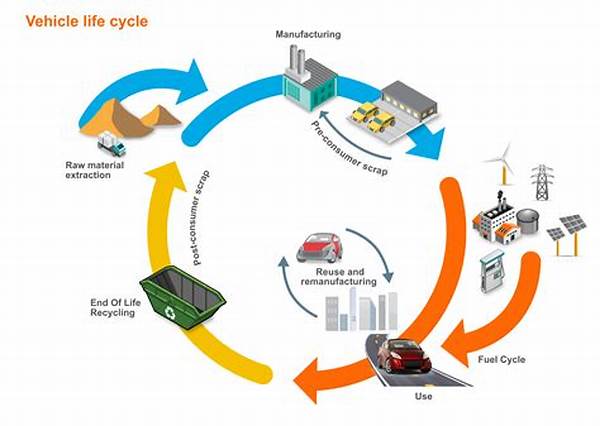
Sustainable Vehicle Lifecycle Practices
In today’s world, where climate change and environmental degradation loom large, making conscious choices regarding our vehicles has become imperative. The automotive industry is a significant contributor to global pollution, and as such, adopting sustainable vehicle lifecycle practices can have a profound impact on our planet’s health. Transitioning towards these practices is not simply a noble choice; it’s an essential move for anyone who recognizes the urgency of our current environmental crisis. By ensuring that every phase of a vehicle’s life, from production to dismantling, follows sustainable practices, we can significantly reduce its carbon footprint and foster a healthier ecosystem for future generations.
Read Now : Money-saving Vehicle Repair Tips
Understanding Sustainable Vehicle Lifecycle Practices
Sustainable vehicle lifecycle practices encompass all the stages of a vehicle’s existence—from raw material extraction to manufacturing, usage, and eventual recycling. These practices are designed to minimize environmental impact at every step. Transitioning to such a model not only helps in lowering emissions but also encourages more efficient resource utilization. It challenges us to think holistically and make decisions that prioritize sustainability over mere short-term gains, urging us to consider longevity and environmental responsibility in every vehicle-related decision we make.
The Benefits of Adopting Sustainable Practices
1. Cost-Efficiency: Implementing sustainable vehicle lifecycle practices often leads to better fuel efficiency and reduced maintenance costs, saving money in the long run.
2. Environmental Responsibility: By minimizing pollution and conserving resources, these practices protect ecosystems and reduce carbon footprints.
3. Boosting Innovation: Adopting sustainability-driven methods encourages technological advancements and innovation within the automotive industry.
4. Regulatory Compliance: With stricter emission norms, sustainable practices ensure compliance, avoiding potential fines and sanctions.
5. Enhancing Brand Image: Companies that implement and promote sustainable practices often see an improvement in their brand reputation and customer loyalty.
Making a Difference with Sustainable Vehicle Lifecycle Practices
Embracing sustainable vehicle lifecycle practices signifies a meaningful shift towards a greener future. It isn’t simply an option for the privileged or a marketing gimmick for companies; it’s a collective responsibility that demands active participation. By adopting these practices, businesses can differentiate themselves as leaders in environmental stewardship, showing a commitment to both ecological integrity and social responsibility. As consumers, choosing vehicles designed and produced with sustainability in mind ensures that our transportation choices align with our environmental values and long-term goals.
Strategies for Implementing Sustainable Changes
To effectively implement sustainable vehicle lifecycle practices, organizations must invest in research and development. Leveraging cutting-edge technologies like electric powertrains, lightweight materials, and renewable energy sources significantly reduces the environmental impact of vehicles. Furthermore, extending the product life through remanufacturing and embracing circular economy principles can dramatically decrease waste. Public support for these practices should be encouraged, driving a societal shift towards sustainable solutions, ultimately reducing the automotive industry’s environmental footprint.
1. Utilize Renewable Materials: Opting for renewable or recyclable materials reduces manufacturing waste and energy consumption.
2. Encourage Electric Vehicles: Transitioning to electric vehicles helps cut down on emissions that contribute to global warming.
3. Invest in Research: Innovations in manufacturing processes can significantly enhance sustainability initiatives.
4. Promote Circular Economy: Adopting a circular approach ensures that resources are reused, reducing waste.
Read Now : Budget-friendly Automotive Maintenance
5. Consumer Education: Educating consumers on the benefits of sustainable vehicle lifecycle practices fosters informed purchasing decisions.
6. Government Support: Policies and incentives can accelerate the shift towards sustainable practices.
7. Collaborative Efforts: Partnerships between automakers, governments, and NGOs can drive comprehensive, impactful changes.
8. Lifecycle Assessment: Continuous assessment helps identify areas where sustainability can be improved.
9. Sustainable End-of-Life Disposal: Proper recycling and disposal are critical for reducing the lifecycle impact.
10. Regular Audits: Ensuring compliance and identifying improvement areas requires consistent reviewing and auditing of practices.
Encouraging a Global Commitment to Sustainable Practices
The movement towards sustainable vehicle lifecycle practices demands a concerted global effort. It’s more than a local initiative; it’s a worldwide commitment to reducing emissions, conserving resources, and promoting energy efficiency. Each stakeholder, from manufacturers to consumers, plays a pivotal role in transforming the automotive industry into a beacon of sustainability. Global collaboration and shared knowledge are crucial in overcoming the challenges faced in the pursuit of a sustainable automotive future.
Ensuring these sustainable practices are implemented worldwide may seem daunting, but the collective rewards are undeniable. By pushing for international standards and agreements, we can foster a universally accepted approach to vehicle sustainability. Every vehicle user and manufacturer has a responsibility to champion these practices, setting a powerful example for others to follow. As this movement gains momentum, it promises not just environmental relief but a redefined blueprint for how industries can thrive sustainably.
Making Personal Choices Align with Sustainability
As individuals, the decision to embrace sustainable vehicle lifecycle practices calls for an awareness of the profound impact our choices have. Consider not just the technical specifications or luxury of a vehicle, but the holistic benefits it offers when aligned with eco-friendly practices. Opt for manufacturers who prioritize sustainability, and advocate for policies that drive positive change in the automotive industry. Your informed choices can act as a catalyst for widespread adoption of eco-conscious practices.
By acknowledging the power of our everyday decisions, we actively support a transition towards sustainability. It’s about taking small, deliberate steps that collectively lead to significant change. Encouraging others in your community to make informed transportation choices helps foster a culture that values responsibility and environmental stewardship. Together, through informed choices, we can promote sustainable vehicle lifecycle practices and pave the way for a more sustainable future for all.